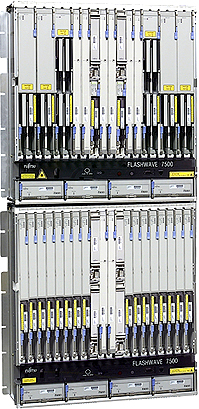Archived content
NOTE: this is an archived page and the content is likely to be out of date.
FLASHWAVE7500 Multifunction ROADM/DWDM Platform (2003)
Making the Internet's backbone more efficient

As the Internet expanded rapidly in the late 1990s, the world needed higher capacity networks. In 1998, Fujitsu, which had been researching optical amplifiers and other technologies related to this issue, released FLASHWAVE-320G, a new platform that increased transmission capacity from 10Gbps to 320Gbps. The following year, Fujitsu released FLASHWAVE7700, the world's largest capacity system at the time, capable of carrying up to 1.76 Tbps. Then, after the IT bubble burst and networks needed to become more economic, Fujitsu succeeded in developing a transmission system that could construct and expand networks efficiently and freely set transmission capacity requirements. The system was Fujitsu's FLASHWAVE7500, which was released in 2003 and served to support the Internet's backbone. The system gradually gained recognition amongst carriers in and outside Japan and captured the top share of the U.S. market in 2008.
